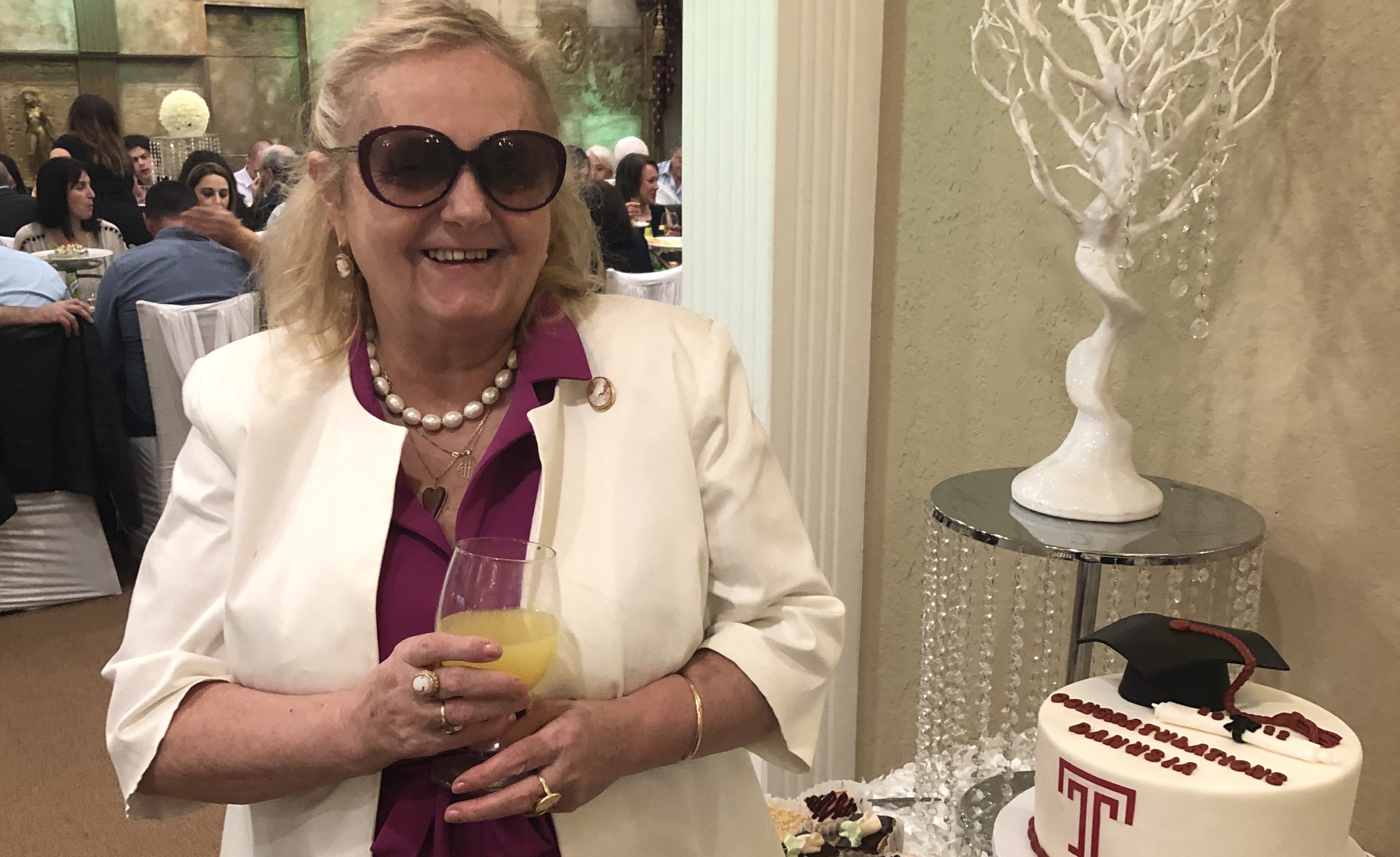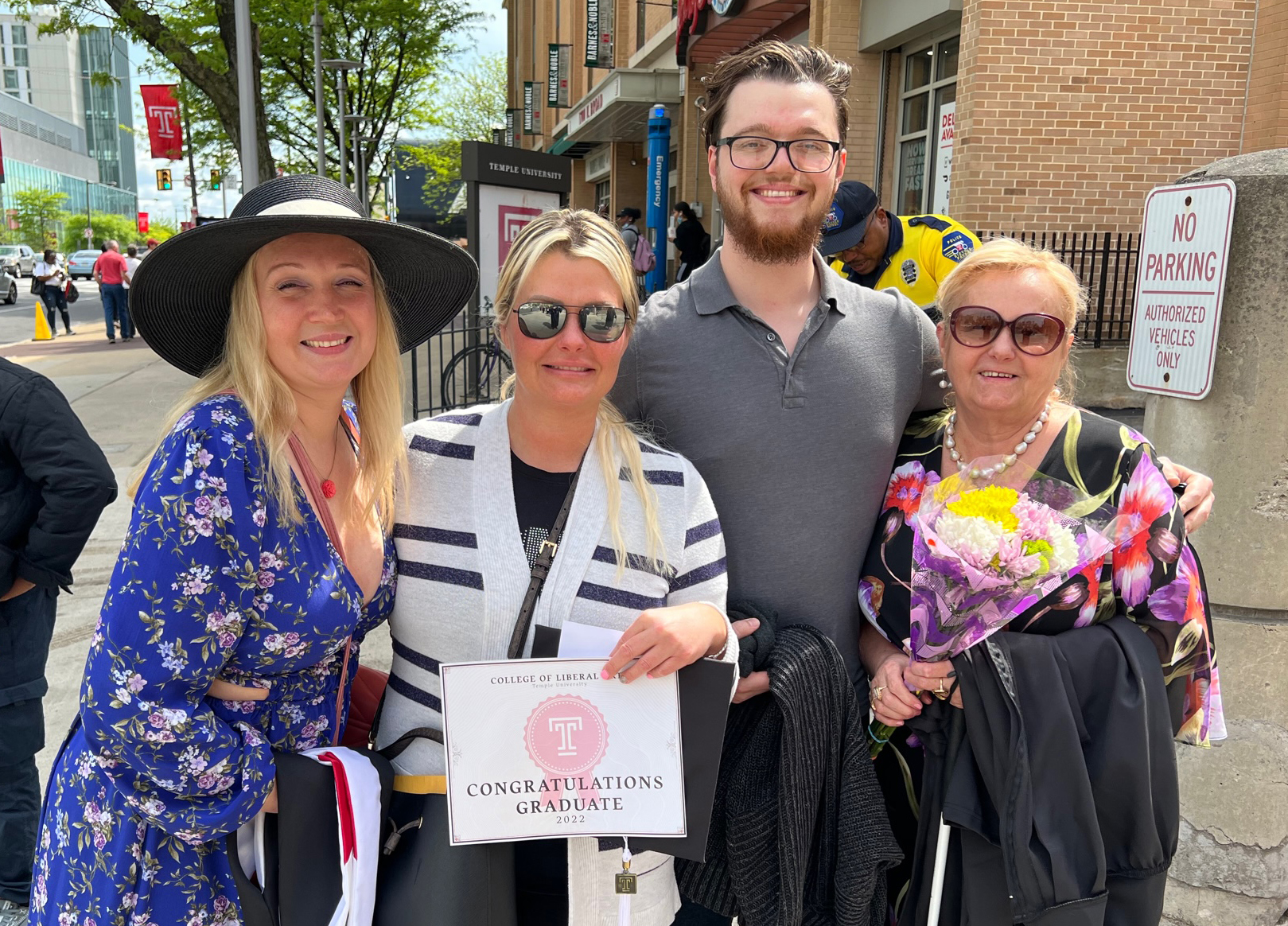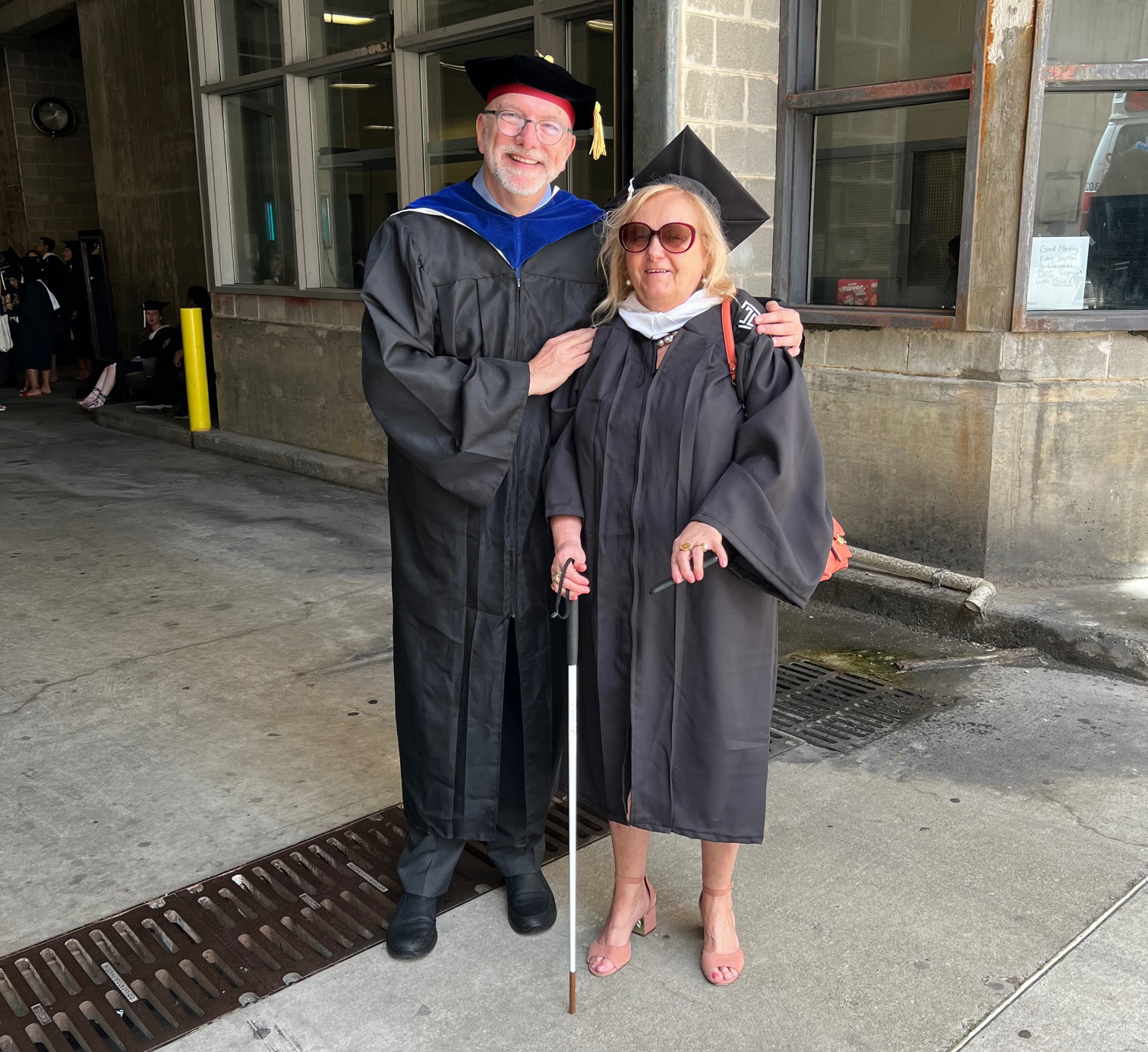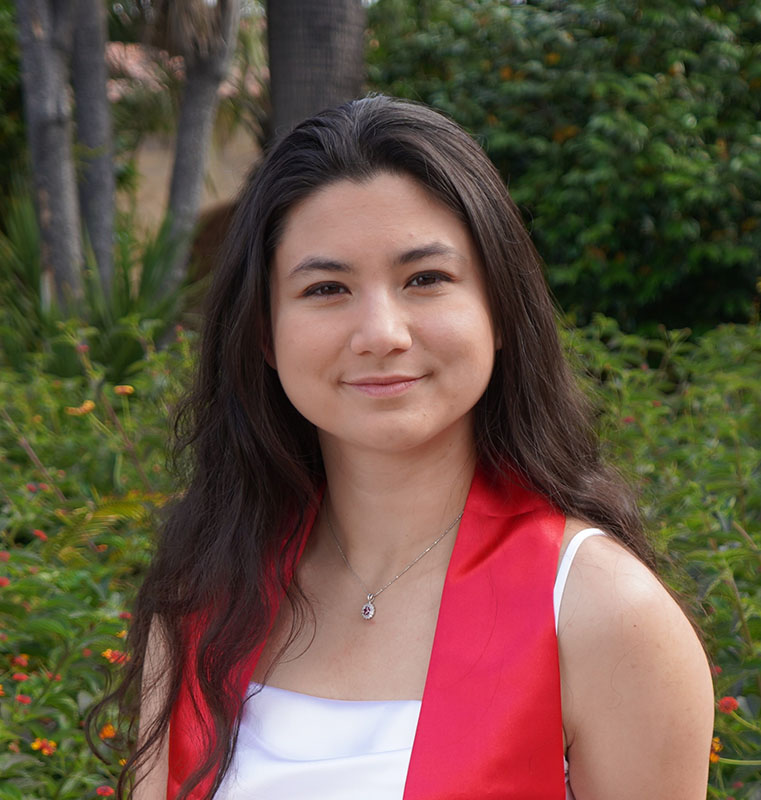
The cool blue glow of a desktop monitor is the only light in Donna’s office as she sits at her desk, rubbing her temples. For most Temple University students, finding sources for a research paper is a relatively mundane task. For Danuta “Donna” Meisel, a blind, 72-year-old Polish immigrant with throat cancer, a literature review is a virtual odyssey.
Unlike her younger tech savvy classmates, Donna struggles to multitask online. She uses her desktop computer to read documents and her laptop for Zoom calls- and on this day her laptop is downstairs.
She shuffles to the stairs of her three-level Philadelphia row house and feels in the dark for the bannister she’s known for 33 years. It guides her down, then up, what feels like a 13-step mountain.
Plopped back in her swivel chair, Donna confronts her laptop. As her fingers run along the notches of the keyboard, she counts in her head until arriving at the arrow keys. Click. Click. “Outlook,” says JAWS, the screen-reader software that makes both of her devices accessible. Click. Click. Click. Donna listens to JAWS read through her inbox until she hears what she’s looking for.
“Hi there, you are invited to a scheduled Zoom meeting,” the monotone voice announces.
Click. “H-t-t-p-s-colon-backslash-backslash-t-e-m-p-l-e-dot-z-o-o-m-dot…”
“Why are you talking? Jesus! I don’t want you — what did I do? Shhhh!” Donna mutters.
More clicks interrupt JAWS from reading each individual letter of the Zoom link.
Eventually, Donna’s pale blue eyes, ringed by shadows and framed by loose strands of wispy hair, appear as she joins the call. A Public Health and Social Services librarian at Temple shares the screen. Donna has been scheduling appointments to review library resources with her since the beginning of the semester.
“How have you been?” the librarian says.
Donna reports that she is very bad, as always, and that she has lost weight, again. Health concerns aside, this is a problem for Donna. She often muses that older people look better “a little plump” to hide their wrinkles.
“Do you need to rest now, Donna?” the librarian asks.
“Not this moment, I’m talking to you. No, no, no — I will tell you when I cannot talk,” Donna replies with a wave of her hand. “Let’s do this before I die,” Donna sometimes says, chuckling, at the beginning of calls.
Pain is her norm. Yet Donna says she maintains a 3.78 G.P.A. and has missed just one class for her radiation therapy. She doesn’t accept special treatment and even refused to ask for an extension on a paper due before an eight-hour surgery last Valentine’s Day. When the Handicapable Transportation of Philadelphia shuttle is hours late to pick her up from class, Donna tells her son not to worry about the wait — she is busy listening to her textbooks. Although assignments take her longer, she will continue to take two classes a semester until she completes her master’s degree next year.
Very few students are in Donna’s position. In 2022, the Education Data Initiative reported that only .10% of Americans over 65 were enrolled in higher education of any kind. While there is limited data on how many of these older students are blind, in 2016 the percentage of Americans ages 21 to 64 with a visual disability and a college degree was roughly half of the national percentage, according to the National Federation of the Blind and census reports.
After Temple, unlike many of her classmates beginning their careers, Donna’s future is uncertain. She won’t follow a high-achieving student’s traditional path to success, and she’s not sure what will become of her accomplishments. But she’s used to that, too.
***
Donna has applied to seven academic programs in her 72 years.
Her first acceptance letter, from the Medical Academy of Warsaw, arrived in the spring of 1969. That summer, the quiet industrial suburb of her childhood now seemed more boring than quaint as 18-year-old Donna imagined attending medical school 25 miles away in Warsaw.
It was not a diagnosis that derailed Donna’s plan to become a dentist — she didn’t know she would be blind until 15 years later. It was a boyfriend.
Donna remembers her “lovely” boyfriend’s paranoid objection: “All medical girls are whores because they have to sleep with the adjuncts, and you’re not going to sleep and have sex with the adjuncts. You have to change the university!”
In the fall, she began an agriculture program in Warsaw, instead. “I was in love like hell,” Donna now says, “How stupid I was!”

These studies were soon interrupted by a different worry: money. In the year of the Polish protests over spiking food prices, Donna made just enough to pay for one pair of good shoes, lunch, and bus fare to the Polish Ministry of Justice. There, she worked part-time shifts as a secretary reading letters from Holocaust survivors who were requesting reparations.
Almost 50 years later, for a class at Temple, Donna would read a book on Nazi war crimes that was written by her old supervisor. In her 20s, though, Donna spent her free time wondering how she would ever be able to buy a car. Maybe if she took a gap year in America she could save up enough?
Donna began applying for a coveted visa to the United States. Like many Poles whose requests had been rejected out of concern that they secretly intended to stay in the U.S., Donna was denied twice. At last, with a good word from a family friend at the Ministry of Justice, Donna’s third application was accepted.
New York City’s January air was bleak and biting when Donna landed in 1976. She left 24 hours later for Philadelphia, where she could live with her friend’s mother in a Polish neighborhood and work at a dinner roll factory.
Donna’s new “sardine home” was no utopia, but she stayed. Maybe there was something romantic about finding her way to the U.S. in the country’s bicentennial year, a fact Donna likes to note. Or maybe, as she says now, Donna had always known she wouldn’t return to be a “Russian slave” in a “communist country.” As a young woman, Donna could see that, while there was more trash on the streets than in Poland, the Philadelphia grocery store shelves were always stocked, and no one asked her to prove her belongings weren’t stolen. That was enough.
The hunt for an affordable local degree program began. The cheapest was a dental technician certificate. Donna was accepted. Later, after earning the certificate, she started community college.
In her first year in the United States, Donna met another Polish immigrant during her lunch break who would become her husband. Soon, she was wrapped up in a cocoon of married life that would slowly unravel.
In 1977, Donna gave birth to her first child. Her mother flew from Poland for the first and last time to visit her. (Donna’s mother died before she could get another visa to visit again). Four more kids followed and Donna dropped out of community college to take care of them.
In 1984, Donna was diagnosed with retinitis pigmentosa, a rare and incurable genetic eye disease. It was getting harder to oversee the finances of the car repair shop she and her husband managed; Donna could no longer read checks without a magnifying glass.
In 1990, Donna’s husband decided to move back to Poland. If she refused to move back with him, she would be cut off.
“So that’s what happened,” Donna says now with a shrug.
Without her husband’s support, Donna learned firsthand “that nobody can be rich from welfare.” Still, it was an easy decision to stay in Philadelphia. There was more assistance for visually impaired people, and her children were American now. Donna wouldn’t take that life away from them, even if it meant becoming a single mother.
By the time Donna put the last of the five Meisel children through college — a priority her son says she had, to put it lightly, drilled into them – her vision was so bad that she could no longer drive a car. But she was intent on picking up where she left off.
Now is the time for me to learn what I want to learn, Donna told herself.
In 2015, she re-enrolled at the Community College of Philadelphia and bought her first computer — handwritten papers were no longer accepted. In addition to her regular classes, Donna learned to operate JAWS on her new device during lessons with Pennsylvania’s Bureau of Blind and Visual Services twice a week. During a course taught by a former State Trooper, Donna was “bit by the bug of juvenile justice.”
“So I said, ‘Okay, this is not enough for me, I should go to university and get my bachelor’s degree.’”
With the aid of several scholarships, Donna started her bachelor’s program in Juvenile Justice at Temple University in 2018. She graduated in 2022 and was accepted to two master’s programs at Temple. She began her social work master’s in the fall.
***
A cloud of competing voices overwhelms the Zoom: Donna’s thick Polish accent, the librarian’s empathic directions, JAWS’ lifeless narration of every onscreen action. It is these kinds of calls that fuel Donna’s description of her helper: very smart, very helpful, and very bossy.
The goal of this session is to help Donna understand the structure of websites she cannot see. The librarian is in the middle of explaining how Donna can use key commands to direct JAWS to the sections she’s interested in, instead of clicking through everything on the screen, when Donna springs up.
“Hold on! Hold on! You have to hold on a minute! I forgot that I have something on the stove and my son is not home!” The apologies Donna yells grow faint as she hustles off screen to rescue her tomato soup. “Stupid cat, go away!” is the last thing heard in the distance.
Soup secured, the women resume with JAWS until Donna finally interrupts the chatter. “You’re talking Chinese to me! … I have to learn, again, how to open the library on my computer? What to do? I have no idea.”
They review how to pull up Temple’s homepage.“How do you help somebody who’s just listening?” the librarian keeps asking herself. She makes a note to go over bookmarking.
Everything would be much easier if the librarian just emailed Donna attachments of the documents she needs, but she wants to make sure Donna can navigate the library herself if she’s going to pursue a career as a social worker.
“One of the standards for social work is that you’re able to do research, so how would that work?” she asks.
“That’s two years ahead of me. Don’t ask me because I don’t know. I have two years to learn something,” Donna says, sighing.
Donna never imagined just how debilitating her cancer would be by the end of the semester. Of late, she gets tired listening to her son read her the Chinese restaurant menu when he calls to ask what to order Donna for dinner. Besides, thinking about food is no fun when you have mouth sores. The only thing soft enough for her to swallow is egg drop soup.
Still, Donna stresses that she is not the kind of 72 year-old who listens to TV all day. She’s been to the musical Hamilton (with audio-captioning). She swims twice a week and goes out to eat when her friend visits from Florida. Well, her friend eats. Donna sits. Unless they’re getting Mexican food. Then Donna can eat guacamole, which is also soft enough.
Donna’s youngest son Thomas, who lived with her last year, says he would like to describe his mom as a woman who has it all together. But he has seen Donna crack under the frustration of knowing what to write but being unable to decipher the layout of a keyboard to communicate her thoughts.
Nevertheless, Donna is relentless. The day Thomas had to take her to the hospital for a stress-induced panic attack, Donna wouldn’t stop asking how she was going to make it to school the next day. “If she could go to school literally up until the day she passes, she would gladly do that,” Thomas says.
When asked how the library can help, Donna suggests: “Hit me over the head with baseball bat, maybe my brain cells will open and I can do it?” Turning serious, Donna says she needs someone to take her through each function, step by step. While many blind people have mastered tools like JAWS, Donna is unable to afford specialized classes that could help her catch up.
Informed by Donna’s struggles, Temple’s librarians are adapting their resources and guidelines to be more accessible for blind students. They want Donna to be the first to test new library tutorials in the fall.
When Donna has finally finished a paper, she takes out her recorder. She follows along as her son explains how to attach a document to an email she can send to her professor. This is the same way she slowly but surely learned to copy and paste four years ago.
***

Every spring, Keith Gumery, an English professor at Temple, flies from Denmark for graduation. Last year, he found Donna as she and her family were taking their seats. Donna’s daughter whispered that a professor was approaching. Why the hell is a professor coming to see me? Donna wondered. Gummery introduced himself and asked to walk Donna to the stage. They sat together for the rest of the ceremony.
Later, Gummery asked Donna if he could share her achievement on Facebook.
What the hell did I do that is so important? Donna remembers thinking.
After years of her ex-husband questioning what she’s achieved with her life, Donna can only see herself as a regular person: “When somebody [is] saying a praise for me… I just want to cover my face and hide. But I think I shouldn’t. I should be proud [of] what I did, right?”
Alone in front of her bathroom mirror, Donna gives herself pep talks.
“I [look] at my sink with my blind eyes. I say, ‘OK, I’m going to die. When? Tomorrow? 20 days? 20 years? I have to read whatever I have to read. I have to create an outline of my work. I have to ask people to help me…’ So I’m busy.”
Donna is the first to admit that she doesn’t need a master’s degree — who wants to hire a 72-year-old blind woman? Still, she’s used to forging the future she’s always wanted, regardless of what anyone else thinks is worthwhile. When she is traveling or learning, Donna doesn’t have to think about being sick or blind.
“I have to keep my mind occupied. Because I think if I didn’t I would get into depression,” Donna says. “I was dreaming to study so I did it — very late in my life, but I did it.”
Donna has already put down a deposit to complete a second master’s in juvenile justice once she finishes her social work degree, motivated by the injustices she’s witnessed in the U.S. social service system.
When she graduates, Donna plans to volunteer as a Court Appointed Support Advocate with CASA, an organization that supports under-resourced youth and their families in Philadelphia courtrooms. Last summer, she completed CASA’s training program, learning how to ask questions when she can’t see how the kids she would work with are doing.
There are other personal milestones coming, too. At the end of the semester in May, Donna finished radiation. In August, she’ll be tested for remaining cancer cells. She plans to visit family in Europe this summer, packing her laptop to continue with online classes.
There won’t be any frivolous purchases of a whole new summer collection — “What am I going to do with it?”– but Donna did buy three new dresses for when she starts gaining weight again. Donna says she looks forward to not looking like a “dead frog.”
And there’s another mountain to climb.
“Kilimanjaro is a snow-covered mountain 19,710 feet high, and is said to be the highest mountain in Africa…”
As a girl in Poland, Donna watched Ernest Hemmingway’s words fill her local cinema’s screen. As Gregory Peck lay dying in his tent, Donna was focused on the beauty of the technicolor peak above him.
Even though she can’t remember the plot of 1952’s The Snows of Mount Kilimanjaro anymore, Donna has not forgotten her dream of one day traveling to Tanzania herself.
When she is well enough, Donna and her two sons will spend seven days camping and hiking to the summit of Mount Kilimanjaro with the aid of two specialized guides. Sure, Donna is disabled, but she’s a good walker. The sunrise is said to be legendary, but her reward doesn’t have to be like everyone else’s.
“I can touch the trees. I can touch the grass. I can hear birds singing. For me this would be [a] really big achievement,” Donna says with a rare smile.

